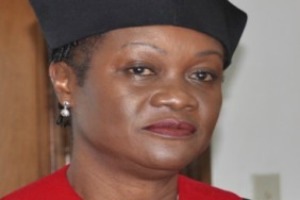Who will replace PYJ?

The narrator: With just one day to the poll in the Nimba Senatorial by election, stakes remain high, as prominent national and political figures throw their weights behind their choice candidates.
Amongst the prominent national figures are former President Sirleaf and former Vice President Jewel Howard-Taylor, who are leading an array of women in support of Madam Edith Gongloe-Weh, sister of former Presidential candidate and Human Rights lawyer Cllr. Tiawon Gongloe. Madam Gongloe-Weh’s supporters also include former Presidential candidate and political leader of the Alternative National Congress, Mr. Alexander Cummings.
On the other hand, former President George Weah is leading the support for his party’s candidate in the race amid reports of divided support within the ranks of the CDC for its candidate, while incumbent President Boakai and his Vice President who is also leading an array of Government officials are in the county campaigning for Rep. Kogar.
By Edwin N Khakie
The upcoming senatorial by-election in Nimba County—set for Tuesday, April 22, 2025—promises to be a high-stakes political showdown, sparked by the passing of the late Senator Prince Yormie Johnson. A towering figure in Liberian politics for years, Johnson’s influence in Nimba loomed large due to his populist rhetoric, ethnic appeal among the Gio and Mano communities, and kingmaker role in national elections.
This election represents a defining moment for Nimba County: will it cling to the political legacy of Prince Johnson or pivot toward a more reformist, technocratic direction? With seven high-profile candidates in the race, the contest is expected to be fiercely competitive and closely watched across Liberia.
Candidate Overview
Madam Edith Gongloe-Weh
Political Background: Former Superintendent of Nimba; three-time senatorial contender, widely respected for her integrity and public service.
Strengths:
High name recognition.
Strong support from women, youth, civil society, and urban voters.
Seen as a clean, reform-oriented alternative to the old guard.
Challenges:
Needs to drive high turnout in vote-rich urban centers like Ganta, Sanniquellie, and Bahn.
May struggle to win over rural voters still loyal to the legacy of Prince Johnson.
Rep. R. Martenokay Tingban
Political Background: Former Representative of District #9.
Strengths:
Deep roots in lower Nimba.
Strong ties to traditional political structures.
Experienced in legislative and local governance.
Challenges:
Limited appeal among younger and first-time voters seeking change.
Wonokay Farngalo
Political Background: Former Deputy Finance Minister and development expert.
Strengths:
Technocratic credentials and experience in public finance.
Likely to draw support from professionals and the business sector.
Challenges:
Low name recognition.
Minimal rural reach.
Needs a robust, well-funded campaign to stay in the race.
Rep. Samuel Kogar
Political Background: Incumbent Representative from District #5, known for his assertive style and grassroots presence.
Strengths:
Strong base in Gbehlay-Geh and surrounding areas.
Effective ground game with loyal district supporters and youth outreach.
Challenges:
May face difficulty expanding beyond his core constituency.
Risk of vote-splitting with other candidates from central Nimba.
Cllr. Garrison Yealue
Political Background: Legal professional and former Governance Commission Chair.
Strengths:
Reformist image with appeal among educated voters and religious communities.
Challenges:
Limited grassroots structure.
Could split the urban reform vote with Gongloe-Weh and Farngalo.
Mack Gbliwon
Political Background: Businessman and first-time candidate.
Strengths:
Outsider appeal in a field of seasoned politicians.
Challenges:
Very low name recognition.
Lacks the political machinery to mount a serious challenge.
It could act as a spoiler in key precincts.
Dr. George Gonpu
Political Background: Educator and policy expert.
Strengths:
Appeals to academia and younger voters.
Focus on education and development resonates with progressives.
Challenges:
Minimal political infrastructure.
Like Gbliwon, he is likely to influence the outcome more through vote distribution than direct support.
Electoral Dynamics
Ethnic and Regional Factors
The Gio and Mano remain critical voting blocs. Candidates who forge strong alliances with traditional elders and community leaders in rural areas will hold an edge.
Urban vs. Rural Divide
Urban centers like Ganta and Sanniquellie are likely to favor reform-minded candidates—Gongloe-Weh, Farngalo, and Yealue. Rural strongholds, especially in Tappita, Gbehlay-Geh, and Kparblee, may lean toward veterans like Kogar, Tingban, or those backed by remnants of Prince Johnson’s movement.
Turnout Trends
In a fragmented field, voter turnout will be decisive. High turnout in urban areas could propel reformists to the front. Lower turnout may benefit candidates with well-established rural machines and loyal voter bases.
Predicted Front-Runner Edith Gongloe-Weh – Poised to lead if she consolidates urban and youth support. Her reformist brand and name recognition are key assets. Rep. Samuel Kogar – A rural heavyweight with grassroots strength; a serious contender if he expands beyond his home turf.R. Martenokay Tingban – Quietly influential, especially among older voters and traditional structures.
Dark Horses
Farngalo and Yealue may peel off enough support from undecided and educated urban voters to influence the balance, but risk dividing the reform vote.
Dr. Gonpu and Gbliwon likely won’t win, but could play spoiler roles in closely contested districts.
Prediction Summary
This by-election is shaping up to be a tight three-way race between Edith Gongloe-Weh, Samuel Kogar, and R. M. Tingban. Gongloe-Weh stands the best chance if she energizes urban voters and leverages her reformist momentum. However, if the reformist vote is divided and turnout remains low, Tingban or Kogar could edge ahead by mobilizing loyal rural voters and tapping into traditional networks.



















